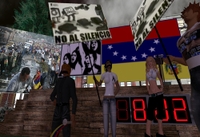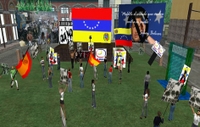Venezuelan protests: blurring the line between “real” and “virtual”

“In parallel with protests in Caracas, avatars of real Venezuelans protest Chavez’s closing of a major TV station… Some suggest a CIA conspiracy behind the scenes, implying that the Venezuelan protest in general is
virtual. In response, actual Venezuelans show up, and explain their
point of view. A metaverse protest over a real world event, in other
words, has provoked a debate over how real the event itself is.”

“Residents from Venezuela gathered Sunday in Moshi Park, protesting President Hugo Chavez’s abrupt closing of RCTV, a television station controlled by his opposition. That move has provoked outrage on the streets of Venezuela, followed by a forceful response
from Chavez’ government. All that in mind, it seemed strange to hold
a rally in a virtual world, and I put that question to Shinya Tandino,
a leader in Second Life’s “RCTV Libertad expresion VENEZUELA” group.
Her explanation was unique:
by holding it in Second Life, there was no way for Chavez’s regime to
label it as violent. “[T]he protest in my country are peaceful,” Shinya
argues, “but the government will say the opposite… we need and we
want other ways that let us raise our voice in a peaceful way.”
As it happens, she is a Venezuelan now outside her homeland, but was
recently there, protesting in streets where the violence is all too
real. “I know how it feels when you are there and you feel alone,” she
tells me, “and that the rest of the world see us, but can’t do much for
us. But when they show support or do protest, [it gives] more energy
to the people from Venezuela.” Many who joined her in the march are
still based in the country, however, and so the protest also became a
place for Venezuelans divided by geography to come together– and for
those inside the country to share their eyewitness accounts.”
Stay tuned — with the recent uproar of Kremlin-financed cyber-attacks against targets in Estonia, the constant rumors of potential Chinese cyberspace attacks against the U.S., and now this cyberspace showdown between the people of Venezuela and the government of Venezuela, have we reached a new era in the way that national political disputes are settled?
[image: Venezuelan protests]




